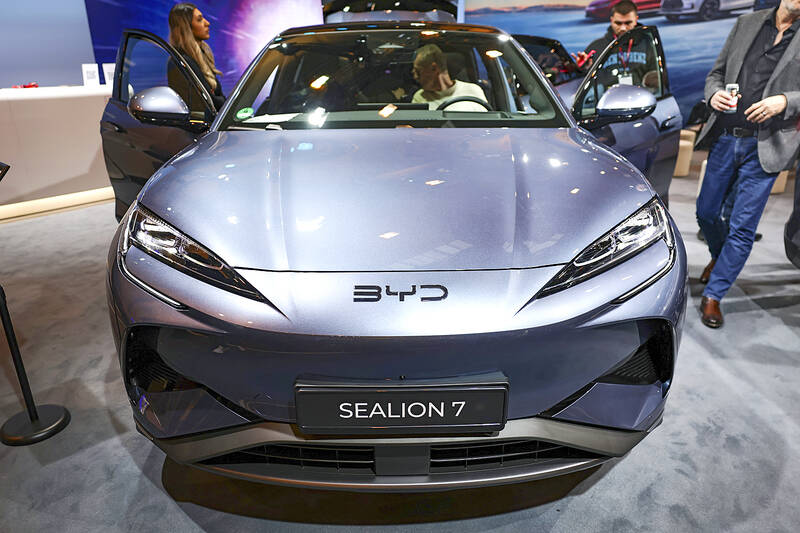China’s BYD Co (比亞迪) enjoyed a year-end surge to push total sales to 4.25 million passenger cars last year, narrowing its gap with Tesla Inc as the two vie for the crown of top-selling electric vehicle (EV) maker of the year.
The Shenzhen-based carmaker, which stopped making vehicles entirely powered by fossil fuels in 2022, hit a new monthly sales record last month, spurred on by subsidies and offering extra incentives to buyers.
BYD sold 509,440 plug-in hybrid and pure-electric passenger vehicles last month, the company said yesterday. The figure includes 207,734 EVs, taking the annual tally of battery-powered car sales to 1.76 million. Overall annual sales increased 41 percent year-on-year.

Photo: EPA-EFE
The rise of BYD as a best-selling car brand stands in contrast to the turmoil facing a growing number of legacy auto giants like Nissan Motor Co, Volkswagen AG and Stellantis NV. Western car brands have faced tumbling sales in China, while also lagging behind on the EV transition.
Tesla will unveil its fourth-quarter sales figures later this week. The Elon Musk-led company needs to deliver at least 515,000 EVs in the final three months of last year to meet its guidance for “slight growth” in annual sales, or 1.81 million deliveries, which would be a quarterly record for the company. Analyst estimates are for 510,400 deliveries, just shy of Tesla’s expectations.
By the third quarter, BYD had sold 1.16 million EVs, lagging Tesla by 124,100. However, the Chinese company has seen a last-quarter surge to narrow the gap with its US rival.
BYD’s surge will help cement its place among the top-selling carmakers globally. Its rise in total sales puts it near to beating Ford Motor Co and Honda Motor Co on an annual basis too. Higher sales will tip the company’s annual revenue over US$100 billion for the first time.
BYD’s gains have been fueled by domestic Chinese sales — and aided in the second half of the year by increased subsidies to convince drivers to ditch gasoline cars.
Its target to sell roughly half-a-million vehicles outside China has fallen short of expectations in the face of pushback from the European Union, which has imposed additional tariffs on Chinese EVs.
In Brazil, one of its biggest overseas markets, BYD is under scrutiny over allegations of slave-like conditions for some construction workers building a new EV factory.

KEEPING UP: The acquisition of a cleanroom in Taiwan would enable Micron to increase production in a market where demand continues to outpace supply, a Micron official said Micron Technology Inc has signed a letter of intent to buy a fabrication site in Taiwan from Powerchip Semiconductor Manufacturing Corp (力積電) for US$1.8 billion to expand its production of memory chips. Micron would take control of the P5 site in Miaoli County’s Tongluo Township (銅鑼) and plans to ramp up DRAM production in phases after the transaction closes in the second quarter, the company said in a statement on Saturday. The acquisition includes an existing 12 inch fab cleanroom of 27,871m2 and would further position Micron to address growing global demand for memory solutions, the company said. Micron expects the transaction to

Vincent Wei led fellow Singaporean farmers around an empty Malaysian plot, laying out plans for a greenhouse and rows of leafy vegetables. What he pitched was not just space for crops, but a lifeline for growers struggling to make ends meet in a city-state with high prices and little vacant land. The future agriculture hub is part of a joint special economic zone launched last year by the two neighbors, expected to cost US$123 million and produce 10,000 tonnes of fresh produce annually. It is attracting Singaporean farmers with promises of cheaper land, labor and energy just over the border.

US actor Matthew McConaughey has filed recordings of his image and voice with US patent authorities to protect them from unauthorized usage by artificial intelligence (AI) platforms, a representative said earlier this week. Several video clips and audio recordings were registered by the commercial arm of the Just Keep Livin’ Foundation, a non-profit created by the Oscar-winning actor and his wife, Camila, according to the US Patent and Trademark Office database. Many artists are increasingly concerned about the uncontrolled use of their image via generative AI since the rollout of ChatGPT and other AI-powered tools. Several US states have adopted

A proposed billionaires’ tax in California has ignited a political uproar in Silicon Valley, with tech titans threatening to leave the state while California Governor Gavin Newsom of the Democratic Party maneuvers to defeat a levy that he fears would lead to an exodus of wealth. A technology mecca, California has more billionaires than any other US state — a few hundred, by some estimates. About half its personal income tax revenue, a financial backbone in the nearly US$350 billion budget, comes from the top 1 percent of earners. A large healthcare union is attempting to place a proposal before